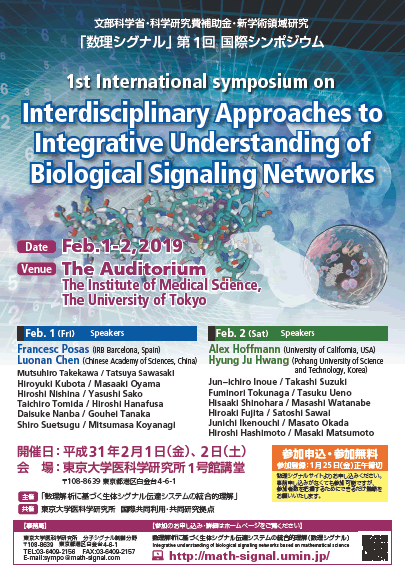文部科学省・科学研究費補助金・新学術領域「数理シグナル」
「数理シグナル」 第1回 国際シンポジウム
| 名称 | 文部科学省・科学研究費補助金・新学術領域「数理シグナル」 「数理シグナル」 第1回 国際シンポジウム 1st International symposium on Interdisciplinary Approaches to Integrative Understanding of Biological Signaling Networks |
|---|---|
| Date 日時 |
Feb.1 (Fri.) - 2 (Sat.),2019 平成31年2月1日(金)、 2日(土) |
| Venue 会場 |
The Auditorium The Institute of Medical Science, The University of Tokyo [Access] 東京大学医科学研究所1号館1F講堂[キャンパスマップ・交通案内] |
| 参加費 | 無料 |
| 参加登録 | 1月25日(金)正午締切 事前申し込みがなくても参加可能ですが、参加者数を把握するためにできるだけ登録をお願いいたします。 |
| ポスター |  PDFダウンロード PDFダウンロード |
| 主催 | 「数理解析に基づく生体シグナル伝達システムの統合的理解」 |
| 共催 | 東京大学医科学研究所 国際共同利用・共同研究拠点 |
| 事務局 | 東京大学医科学研究所 分子シグナル制御分野 〒108-8639 東京都港区白金台4-6-1 TEL:03-6409-2156 FAX:03-6409-2157 E-mail:sympo@math-signal.com |
事前参加申込み
当日参加も可能ですが、参加者数を把握するためできるだけ事前参加登録をお願いします
Program
February 1 (Fri)
| 9:20-9:25 | Opening remarks Mutsuhiro Takekawa |
Session 1. |
MAPK and related signaling I |
| 9:25-9:50 | Mutsuhiro Takekawa “Spatio-temporal regulation of JNK signaling during cell fate decisions” |
| 9:50-10:40 | Special Lecture 1 Francesc Posas (IRB Barcelona, Spain) “Stress adaptation from yeast to mammals; regulation of gene expression and cell cycle progression by stress-activated protein kinases” |
|
Coffee Break (20 min)
|
|
Session 2. |
MAPK and related signaling II |
| 11:00-11:20 | Hiroshi Nishina “Diverse physiological functions of JNK and MKK pathway in the nervous system” |
| 11:20-11:40 | Yasushi Sako “Single-molecule pharmacology of G-protein coupled receptors” |
| 11:40-12:00 | Taichiro Tomida “Dynamics and function of MAPK signaling in skeletal muscle formation.” |
| 12:00-12:20 | Hiroshi Hanafusa “Regulation of EGFR signaling emanated from endosomes by LRRK1” |
|
Lunch (70 min)
|
|
Session 3. |
Mathematical analysis of signal transduction networks I |
| 13:30-13:55 | Hiroyuki Kubota “Selective control of the Insulin-AKT pathway by simultaneous processing of blood insulin in the liver” |
| 13:55-14:15 | Daisuke Nanba “Kinetic analysis and modeling of human epidermal stem cell behavior in multilayered sheet formation” |
| 14:15-14:35 | Gouhei Tanaka “Bifurcation analysis for dynamical behavior in cell systems” |
| 14:35-15:25 | Special Lecture 2 Luonan Chen (Chinese Academy of Sciences, China) “Elucidating biological signaling process by network biomarkers and dynamic network biomarkers s” |
|
Coffee break (20 min)
|
|
Session 4. |
Proteomic approaches to elucidate signal transduction networks |
| 15:45-16:10 | Masaaki Oyama “Integrative analysis of cancer cell signaling networks by post-translational modification-directed proteomics” |
| 16:10-16:30 | Shiro Suetsugu “The data analysis of the coordinates of molecule from super-resolution microscopy for the understanding of the assembly of the protein” |
| 16:30-16:50 | Mitsumasa Koyanagi “Optical regulation of GPCR signalings using bistable animal opsins” |
| 16:50-17:15 | Tatsuya Sawasaki “Cell-free based protein array” |
| 18:30 | Reception Party & Poster session at Sheraton Miyako Hotel Tokyo |
February 2 (Sat)
Session 5. |
NF-κB and related signaling I |
| 9:00-9:25 | Fuminori Tokunaga “Cellular mechanism of LUBAC-mediated NF-kB activation pathway” |
| 9:25-9:45 | Hisaaki Shinohara “The ubiquitin E3 ligase TRAF6 regulates signal-complexes formation for IKK activation in B cell receptor signaling” |
| 9:45-10:05 | Masashi Watanabe “Comprehensive identification of E3 ubiquitin ligase substrates in innate immune signaling” |
| 10:05-10:25 | Hiroaki Fujita “Mathematical modeling of biological systems that regulate cell survival and death” |
|
Coffee Break (20 min)
|
|
Session 6. |
NF-κB and related signaling II |
| 10:45-11:10 | Jun-ichiro Inoue “Regulation of the TRAF6-NF-kB-NFATc1 signal pathway in osteoclastogenesis” |
| 11:10-12:00 | Special Lecture 3 Alex Hoffmann (University of California, USA) “Deciphering the language of immune sentinel cells to specify immune responses” |
|
Lunch(70 min)
|
|
Session 7. |
Mathematical analysis of signal transduction networks II |
| 13:10-13:35 | Takashi Suzuki “Mathematical Modeling for Signal Transmission Pathways inside and outside the Cells” |
| 13:30-13:55 | Satoshi Sawai “ A machine learning and dynamical modeling approach to morphology landscape of migrating cells” |
| 13:55-14:45 | Special Lecture 4 Hyung Ju Hwang (Pohang University of Science and Technology, Korea) “Mathematical Models arising in immune” |
|
Coffee Break (20 min)
|
|
Session 8. Chemical and structural biology approaches to understand signal transduction |
|
| 15:05-15:25 | Junichi Ikenouchi “Molecular mechanisms underlying dynamic behavior of membrane blebs” |
| 15:25-15:45 | Masato Okada “Molecular basis for the regulation of mTORC1 nutrient signaling” |
| 15:45-16:05 | Hiroshi Hashimoto “Structural study on DNA damage response” |
| 16:05-16:25 | Masaki Matsumoto “New platform for protein absolute quantification: a tool for pathway structure determination” |
| 16:25-16:50 | Tasuku Ueno “A functional small molecule-based signal perturbation system” |
| 16:50-16:55 | Closing Remarks Takashi Suzuki |








